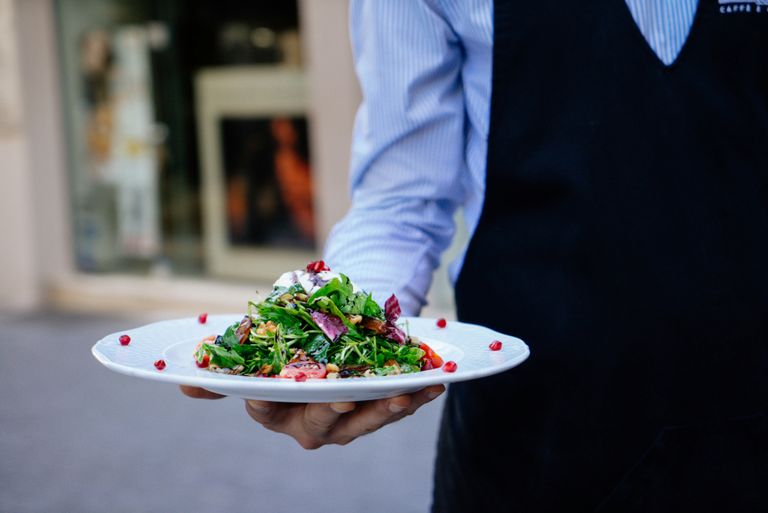
Unsplash

Viernes, 6 de diciembre, 2024.
Antes de empezar, quiero aclarar que en esta ocasión me centraré solo en los aspectos positivos y no en los malos elementos que, como en la viña de la vida, de todo hay...
Recuerdo que en las vacaciones de la universidad era casi obligatorio ir a pasar unos días en la casa de una gran amiga del barrio en el que crecí, la cual, tenía un negocio que su madre le dejó como herencia antes de fallecer con un problema de salud terminal. Era un restaurante que ofrecía comida tradicional, muy bonito, de diseño antiguo, pero muy bien conservado. Había, de lo que recuerdo, como doce mesas, pero siempre estaban llenas porque los alimentos que se ofrecían eran de excelente sabor y una calidad indiscutible... todo era armonioso incluso por la música de fondo que acompañaba a los comesales.
Mi amiga tenía varios empleados que ralizaban turnos rotativos: tres cocineros, seis ayudantes de cocina y seis meseros. Hubo ocasiones en las que yo también colaboraba con ella ayudándole a tomar los pedidos y a servir porque mi mamá siempre me decía que si yo iba de visita a algún lugar, sobre todo si me hospedaría varios días, no tenía que ser una carga, sino una ayuda.
Siempre he sido la asistente de mi mamá en la cocina para luego servir la comida a las visitas que han llegado a la casa, pero ser mesera de un restaurante es totalmente distinto (que entre más grande es el local, más grande el estrés y la responsabilidad) porque este trabajo implica mucha más presión no solo por las comandas que se atienden por tiempos, pero reconozco que cuando entendí todo el manejo que se realiza en el área restaurantera, ser una mesera más del equipo de trabajo, por lo menos a mí, me encantaba, lo disfrutaba al tomar pedidos de los clientes y luego servir.
Por la experiencia que he tenido en el restaurante de mi amiga (a la que visito todavía, pero ya no para quedarme a pasar con ella unos días debido a que mi trabajo me lo impide), puedo decir que ser mesera es, en muchos sentidos, un trabajo que pone a prueba tanto el cuerpo como la mente. El día comienza con energía, pero esa misma energía se va desgastando conforme avanza la jornada por las largas horas de pie, caminando sin parar de un lado a otro, llevando bandejas, platos y bebidas, esto, hace que el cuerpo sienta el peso acumulado de cada turno y hay momentos en los que el cansancio se esconde, apenas se nota en el rostro porque la sonrisa sigue ahí, aunque detrás de ella haya músculos tensos y pies adoloridos porque están tan inflamados que parecen empanadas.

Pixabay
El ritmo de trabajo es otro de los grandes retos que enfrenta una mesera porque los restaurantes, especialmente en horas pico, son un caos organizado. Las órdenes llegan sin parar, los clientes esperan, los cocineros se apresuran y te apresuran, y como mesera estás justo en medio, tratando de mantener todo bajo control. Un error, por pequeño que sea, puede escalar rápidamente: una mesa molesta por un retraso, una confusión con los platillos, un vaso derramado, la vajilla, la cubertería o la mantelería sucia, por eso, todo se monumental trabajo requiere una mente ágil para resolver problemas al instante, incluso cuando el estrés comienza a acumularse hasta querer hacer que estalles.

Tenor
No es solo físico, también es emocional porque cada cliente es un mundo, con sus propias expectativas y, a veces, con su propio mal humor que no sabe ni disimular. Algunos son amables y comprensivos porque hasta te dejan propinas, mientras que otros pueden ser exigentes o incluso groseros, y es ahí que los meseros tienen que absorber todo eso, sin mostrarlo, manteniendo siempre una actitud profesional, aunque por dentro sientan frustración o cansancio, y por qué no: ganas intensas de ponerle el plato en la cabeza a manera de sombrero al cliente majadero que los hace enojar y desconcentrar.
Enfrentarse a la falta de empatía de algunos clientes es una de las partes más difíciles del trabajo, porque no importa lo mucho que se esfuercen, siempre habrá quien no valore su dedicación, y también llegan los días en los que parece que todo conspira en su contra: el sistema de pedidos se cae, los platillos tardan más de lo esperado, alguien llama enfermo y la plantilla queda corta, en esos momentos, los meseros deben sacar fuerzas de donde no las hay porque el servicio no se detiene, incluso fuera del restaurante, muchas veces el trabajo los sigue porque deben recordar horarios, aprender nuevos menús, adaptarse a cambios constantes con jefes también prepotentes e intransigentes.
Sin embargo, aunque los meseros acaban sintiendo el cuerpo tan lastimado como si hubiesen tenido una pelea con mapaches enojones, pese a todo, siempre hay puntos admirables y destacables en ellos cuando tienen y muestran vocación en cómo enfrentan cada día por la capacidad de adaptación que muchas veces pasa desapercibida. Hay días en los que quieren tirar la toalla, pero regresan al día siguiente: listos para empezar de nuevo, con la misma sonrisa y la misma disposición, no porque sea fácil, sino porque saben y entienden que su labor, a pesar de ser menospreciada por cientos, importa y también es valorada por miles.
Es fácil entrar a un restaurante y concentrarse únicamente en el menú, en el ambiente, en lo que queremos pedir. A veces olvidamos que detrás de cada experiencia gastronómica hay un engranaje humano que hace posible que todo funcione y en el corazón de ese engranaje están los meseros. Su labor va mucho más allá de llevar platos de un lugar a otro porque son el puente entre la cocina y nosotros, los que transforman una simple comida en una vivencia completa.
Un buen mesero no solo toma una orden, sino que presta atención a los detalles que a menudo pasan desapercibidos: si necesitas un poco más de agua antes de que tengas que pedirla, si algo no está a tu gusto, o incluso si simplemente necesitas un poco de espacio para disfrutar del momento... son ellos quienes perciben el ritmo de la mesa, el estado de ánimo del cliente y ajustan su actitud para que todo fluya y eso no es tarea fácil, ya que requiere empatía, paciencia y una energía constante que muchas veces no se les reconoce.
Como clientes, a veces caemos en el error de pensar que su atención es un derecho, olvidando que son personas con días buenos y malos, con cansancio acumulado, con historias propias que cargan mientras intentan hacer su trabajo lo mejor posible porque incluso yo he visto meseras embarazadas realizando su labor con mucho gusto, por eso, creo que nuestra actitud hacia ellos importa más de lo que pensamos, ya que un simple "por favor" o "gracias", una sonrisa sincera o un poco de paciencia en los días en los que el restaurante está lleno, pueden marcar la diferencia.

Tenor
También está el tema de las propinas, que para muchos meseros son más que un gesto amable: son una parte significativa de su ingreso, aunque el sistema varía de un lugar a otro, dejar una propina justa es una forma de valorar el esfuerzo y reconocer el servicio recibido, esto, va más allá del monto, es una señal de respeto por alguien que dedicó tiempo y atención a tus solicitudes, pero no todos los clientes lo ven así y se vuelven más y más devotos del santo de la tacañería al punto de que si se caen de codo no se fracturan el brazo, sino que el pavimento es el que sufre las consecuencias de tanta dureza.
He estado en ambos bandos, tanto como cliente y también como mesera emergente, de paso, y puedo decir con toda certeza que ser clientes no significa tener una carta blanca para exigir de manera desmedida o tratar con indiferencia, sino que se trata de una oportunidad para demostrar gratitud y humanidad, incluso en un contexto tan cotidiano como lo es el de comer fuera.
El trato que damos a quienes nos sirven habla más de nosotros que de ellos porque detrás de cada sonrisa que nos ofrecen, hay alguien que eligió, en ese momento, dejar a un lado sus propias preocupaciones para hacer que nuestra experiencia sea un poco mejor. Lo sé no solo por ese trabajo del que disfruto cuando voy a visitar a mi amiga por unos días, sino porque soy enfermera y a veces he llegado a equiparar la labor de un mesero con la que yo he realizado en el hospital a diario, incluso quedándome en turnos extendidos a velar por pacientes en hospitalización o emergencias.
Entonces, leyendo acerca de la labor de los meseros, sintiendo y presenciando para adquirir tu propia experiencia cuando vas a un restaurante... ¿qué más podemos hacer con ellos que devolverles su gesto de atención (a veces personalizada) con amabilidad?
Esta fue una publicación de viernes.
Gracias por pasarse a leer un rato, amigas, amigos, amigues de Blurt.
Que tengan un excelente día y que Dios los bendiga grandemente.
Saludines, camaradas blurtinenses!!

Friday, december 6th, 2024.
Before I begin, I want to clarify that on this occasion I will focus only on the positive aspects and not on the bad elements, which, as in the vineyard of life, there is everything...
I remember that during the university holidays it was almost obligatory to go and spend a few days at the house of a great friend from the neighborhood where I grew up, who had a business that her mother left her as an inheritance before she died of a terminal health problem. It was a restaurant that offered traditional food, very nice, with an old design, but very well preserved. There were, from what I remember, about twelve tables, but they were always full because the food offered was of excellent flavor and of unquestionable quality... everything was harmonious even with the background music that accompanied the diners.
My friend had several employees who worked rotating shifts: three cooks, six kitchen assistants, and six waiters. There were times when I also collaborated with her by helping her take orders and serve because my mother always told me that if I was going to visit somewhere, especially if I was staying for several days, I didn't have to be a burden, but a help.
I have always been my mother's assistant in the kitchen to then serve food to the visitors who have come to the house, but being a waitress in a restaurant is totally different (the bigger the place, the greater the stress and responsibility) because this job involves much more pressure not only because of the orders that are served on time, but I recognize that when I understood all the management that is done in the restaurant area, being another waitress on the work team, at least for me, I loved it, I enjoyed taking orders from the customers and then serving.
From the experience I've had at my friend's restaurant (which I still visit, but not to stay with her for a few days because my job prevents me from doing so), I can say that being a waitress is, in many ways, a job that tests both the body and the mind. The day begins with energy, but that same energy is worn down as the day progresses by the long hours of standing, walking non-stop from one place to another, carrying trays, plates and drinks. This makes the body feel the accumulated weight of each shift and there are times when the tiredness hides, it is barely noticeable on the face because the smile is still there, even though behind it there are tense muscles and sore feet because they are so swollen that they look like empanadas.

Pixabay
The pace of work is another of the great challenges that a waitress faces because restaurants, especially during peak hours, are an organized chaos. Orders come in non-stop, customers wait, cooks rush and hurry you along, and as a waitress you are right in the middle, trying to keep everything under control. A mistake, however small, can quickly escalate: a table upset by a delay, a mix-up with the dishes, a spilled glass, dirty crockery, cutlery or tablecloths, so all this monumental work requires an agile mind to solve problems instantly, even when stress begins to build up until it makes you want to explode.

Tenor
It's not just physical, it's also emotional because each customer is a world, with their own expectations and, sometimes, with their own bad mood that they don't even know how to hide. Some are kind and understanding because they even leave you tips, while others can be demanding or even rude, and that's where the waiters have to absorb all that, without showing it, always maintaining a professional attitude, even if inside they feel frustration or tiredness, and why not: an intense desire to put the plate on the head like a hat to the rude customer who makes them angry and distracted.
Dealing with the lack of empathy of some customers is one of the hardest parts of the job, because no matter how hard they try, there will always be someone who doesn't value their dedication, and there also come days when it seems like everything conspires against them: the ordering system crashes, dishes take longer than expected, someone calls in sick and the staff is short. At those times, waiters must find strength where there is none because the service does not stop, even outside the restaurant. Often, work follows them because they have to remember schedules, learn new menus, adapt to constant changes with bosses who are also arrogant and intransigent.
However, although waiters end up feeling their bodies as hurt as if they had had a fight with angry raccoons, despite everything, there are always admirable and remarkable points in them when they have and show vocation in how they face each day due to the ability to adapt that often goes unnoticed. There are days when they want to throw in the towel, but they come back the next day: ready to start again, with the same smile and the same disposition, not because it is easy, but because they know and understand that their work, despite being undervalued by hundreds, matters and is also valued by thousands.
It is easy to enter a restaurant and concentrate only on the menu, the atmosphere, on what we want to order. Sometimes we forget that behind every gastronomic experience there is a human mechanism that makes everything work and at the heart of that mechanism are the waiters. Their work goes far beyond carrying dishes from one place to another because they are the bridge between the kitchen and us, the ones who transform a simple meal into a complete experience.
A good waiter doesn't just take an order, but pays attention to details that often go unnoticed: if you need a little more water before you have to ask for it, if something is not to your liking, or even if you simply need a little space to enjoy the moment... they are the ones who perceive the rhythm of the table, the mood of the customer and adjust their attitude so that everything flows and that is not an easy task, since it requires empathy, patience and a constant energy that is often not recognized.
As customers, we sometimes make the mistake of thinking that their attention is a right, forgetting that they are people with good and bad days, with accumulated fatigue, with their own stories that they carry while trying to do their job as best as possible because even I have seen pregnant waitresses doing their job with great pleasure, so I think that our attitude towards them matters more than we think, since a simple "please" or "thank you", a sincere smile or a little patience on days when the restaurant is full, can make a difference.

Tenor
There is also the issue of tips, which for many waiters are more than a kind gesture: they are a significant part of their income, although the system varies from one place to another, leaving a fair tip is a way of valuing the effort and recognizing the service received, this goes beyond the amount, it is a sign of respect for someone who dedicated time and attention to your requests, but not all customers see it this way and become more and more devoted to the saint of stinginess to the point that if they fall on their elbow they do not break their arm, but the pavement is the one that suffers the consequences of such hardness.
I have been on both sides, both as a customer and also as an emergency waitress, by the way, and I can say with certainty that being a customer does not mean having carte blanche to demand excessively or treat with indifference, but rather it is an opportunity to show gratitude and humanity, even in a context as everyday as eating out.
The way we treat those who serve us says more about us than about them because behind every smile they offer us, there is someone who chose, at that moment, to put aside their own concerns to make our experience a little better. I know this not only because of the job I enjoy when I go to visit my friend for a few days, but because I am a nurse and I have sometimes come to compare the work of a waiter with what I have done in the hospital on a daily basis, even staying on extended shifts to watch over patients in hospital or in emergencies.
So, by reading about the work of waiters, feeling and witnessing to gain your own experience when you go to a restaurant... what else can we do with them than return their gesture of attention (sometimes personalized) with kindness?
This was a friday post.
Thanks for stopping by to read for a while, Blurt friends.
Have a great day and may God bless you greatly.
Regards, comrades blurtarians!!
Translation: Deepl.com

Hola Hila, 🦊
Recuerdo cuando mi hno trabajó por un par de meses en un restaurante, ese wey llegaba a las 11pm a la casa, no solo cansado físicamente sino también emocional y en ocasiones muy enojón porque nos decía que tenían un jefe gruñón y que no faltaba el cliente insoportable que se creía monedita de oro, quería todo al instante y no admitía un error y tras eso cuando le atendía bien, ni siquiera daba las gracias, claro que también habían esos clientes amables, carismáticos que le daban animo al personal del restaurante, eso decía mi hno... Había días en que le tocaba turno a las 6pm y regresaba a las 3 a 4am porque no solo era restaurante sino que tenían bar, música en vivo... Por eso entiendo tu escrito... Aunque ya mi hno no anda ese mundillo porque ejerce su profesión desde hace años, pues, todas las personas debemos reconocer que las personas que laboran en un restaurante se esfuerzan por dar un buen servicio tanto alimenticio como calidad humana. Se merecen respeto y un enorme aplauso por su esmero.
Gracias por compartirnos tu experiencia, cool tu escrito.
Saludos para ti y tu family.
Chau.
🐺🐺🐺🐺🐺